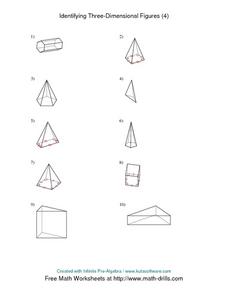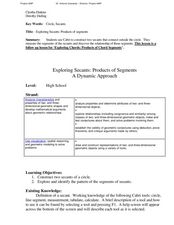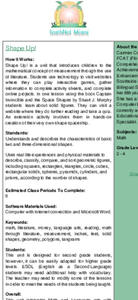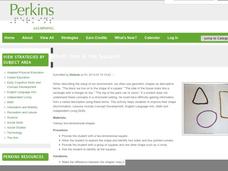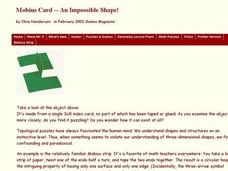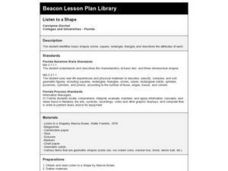Think Map
Know Your Polygons!
Shape shifters recognize characteristics of polygons. Embracing language arts skills in addition to math, they use a thesaurus to pinpoint specific attributes of a set of polygons. They also participate in a 21-question guessing game...
Curated OER
Basic Right Triangles
Elementary schoolers examine the attributes of triangles. In this triangle lesson, learners compare regular triangles and right triangles. They explore vertices and angles and investigate obtuse and acute angles. Pupils draw multiple...
Curated OER
2-D and 3-D Presents at Pedro's Party
Fifth graders draw 2-D and 3-D shapes. They sketch and label geometric figures with correct terminology, then explore parallel and perpendicular lines. Pupils sort and classify shapes drawn.
Curated OER
Parallel and Perpendicular Lines
Learners study parallel and perpendicular lines. For this parallel and perpendicular lesson, pupils explore 2-D shapes and determine if the sides are parallel or perpendicular.
K6 Math
Nets and 3-Dimensional Figures
Three solid figures are lined up down the left side of the page to be compared to three nets down the right side. Learners simply decide if the corresponding net matches the solid figure. Be aware that the publisher's watermark is...
Curated OER
Identifying Three-Dimensional Figures (4)
In this shape recognition worksheet, students study the 3-dimensional figures and identify each one. Students label the 10 figures.
Curated OER
Cubes Everywhere
Students use cubes to construct and visualize two-and three-dimensional shapes to develop spatial thinking and review basic geometric principles through real-life applications. They are given the opportunity to build and build and take...
Curated OER
Exploring Properties of Rectangular Prisms
Students explore the properties of rectangular prisms. For this geometry lesson, students identify properties of two and three dimensional shapes. They use Cabri technology to create polygons and solve problems.
Curated OER
Exploring Secants: Products of Segments
Young scholars explore secants and circles. In this geometry lesson plan, students identify the properties of two and three dimensional shapes. They create arguments to prove the theorems are true.
Curated OER
Shape Up!
Students investigate measurement through the use of literature through this series of lessons.
Curated OER
What a SHAPEly Fit!
Students identify and explore the attributes of polygons. They design and create a quilt square using polygons, and produce a class quilt.
Curated OER
Three Dimensional Figures
For this geometry worksheet, students draw different views, describe patterns, count units, and answer short answer questions with shapes containing cubes. This worksheet would be an excellent homework assignment.
Perkins School for the Blind
Which One is the Square?
Children who are blind need to constantly be engaged in building conceptual understandings of the world around them. This activity will help them grasp the concept of shape, identify shapes, and consider shapes as they are used to...
PBS
Arguing over Area
With the help of the Area Officers and Perimeter Patrol, you learners will develop a better understanding of area and its relationship to perimeter. First, they view a video clip from Cyberchase, and then they visit a website to...
Radford University
Swimming Pool Dilemma
Different shape, same volume—that's quite a challenge! Scholars design a pool for an imaginary client using three-dimensional figures. They must then create a second pool for another client with the same volume, but using different shapes.
Curated OER
Discovering Conic Sections in the Motion of Heavenly Bodies
Math scholars study conics and how they are used today. In this mathematical lesson, pupils construct and slice cones after viewing a demonstration.
Curated OER
Mobius Card- An Impossible shape
In this algebra worksheet, students solve word problems using linear equations and algebraic symbols. There is one problem with an answer key.
Curated OER
Property Lists for Quadrilaterals
Students establish classifications of shapes by various properties (angles, sides, etc.). They introduce the important properties of common shapes. Students develop an awareness of the wide variety of ways the 2-D shapes can be alike.
Curated OER
Relations
Students identify, compare, and analyze shapes and numbers. In this analogies and comparison math lesson plan, students warm up by completing 4 worksheets to familiarize themselves with analogies. In small groups, students are challenged...
Curated OER
Pacing a Gunther Chain
Students pace a Gunther Chain, a measurement used by foresters to determine distance and area. They discuss that pacing is individualized depending on age, gender, etc. They practice to find an average pace. Teams estimate, pace and...
Curated OER
Searching for Angles and Lines
Students work to find and reinforce concepts related to lines and angles. They identify the characteristics of shapes that have one, two, and three dimensions. The students also work on definitions related to the geometry of shapes.
Curated OER
Shape It
Fourth graders use math software and geoboard paper to design basic shapes. They write individual definitions for the geometric shapes based on what they see in the shapes. They apply their background knowledge of the shape as they write...
Curated OER
Listen to a Shape
First graders identify basic shapes (circle, square, rectangle, triangle) and describes the attributes of each. They use magazines to find examples of each shape, and then make a collage.
Curated OER
Patterns Here, There, and Everywhere!
Upper graders access the Microsoft Word program and create patterns by utilizing certain keys on the keyboard. They create picket fences, smiley faces, and hearts. It seems that this lesson has as much to do with keyboarding skills as it...





